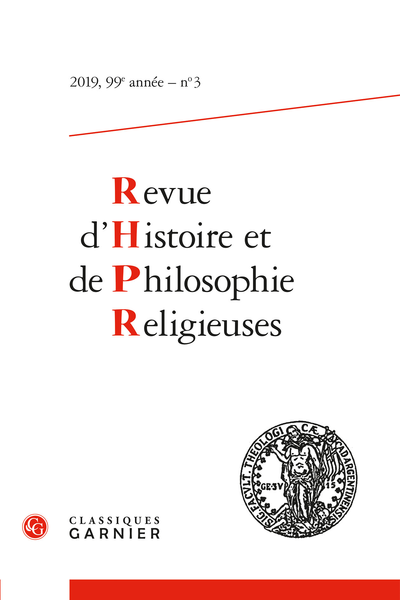
Résumés
- Type de publication : Article de revue
- Revue : Revue d’Histoire et de Philosophie Religieuses
2019 – 3, 99e année, n° 3. varia - Pages : 459 à 461
- Revue : Revue d'Histoire et de Philosophie religieuses
- Thème CLIL : 4046 -- RELIGION -- Christianisme -- Théologie
- EAN : 9782406096832
- ISBN : 978-2-406-09683-2
- ISSN : 2269-479X
- DOI : 10.15122/isbn.978-2-406-09683-2.p.0129
- Éditeur : Classiques Garnier
- Mise en ligne : 10/09/2019
- Périodicité : Trimestrielle
- Langue : Français
Résumés/Abstracts
Sabina Crippa, « Usages rituels des papyrus gréco-égyptiens. Bricolage et marginalité »
Les catégories telles que « marginalité », « bricolage », « croisements de cultures » font l’objet de recherches dans les sciences contemporaines. Ce travail propose d’évaluer leur importance dans l’étude de textes de l’Antiquité, textes composites et issus de la rencontre de cultures très diverses. On réfléchira à partir de ces catégories sur des pratiques rituelles d’origines multiples du monde ancien (PGM), trop souvent étudiées uniquement selon des paramètres chronologiques ou géographiques.
Mots clés : Contacts entre cultures, Antiquité, PGM, transmission de savoirs, marginalisation, pratiques rituelles
Sabina Crippa, « Ritual Uses of Greek-Egyptian Papyri. Eclecticism and Marginality »
Categories such as “the fringes”, “eclecticism”, “culture crossing” constitute the main object of research within contemporary sciences. This article aims to evaluate their importance in studying ancient texts, which are undoubtedly complex and derive from the meeting of very different cultures. By means of these categories one can analyse ritual practices originating in various domains in Antiquity (PGM), which are too often studied only within chronological or geographical parameters.
Keywords: Contacts between cultures, Antiquity, PGM, transmission of knowledge, fringes, ritual practices
Gabriella Aragione, « L’émergence des notions de tolérance et de liberté religieuses dans l’Antiquité chrétienne »
Au début de notre ère, les communautés chrétiennes se trouvent confrontées à des situations où le religieux génère des troubles. Théologiens et autorités politiques essayent de résoudre les conflits et de garantir un modus vivendi acceptable. Les notions de tolérance et de liberté religieuses émergent-elles alors ? On se propose ici de réfléchir à cette question 460controversée à partir de l’analyse des expressions censées véhiculer ces deux principes : tolerantia et libertas religionis.
Mots clés : Tolérance, intolérance, liberté religieuse, conscience, persécutions, dissidences, coercition, Édit de Milan, Cyprien, Tertullien
Gabriella Aragione, « The Emergence of Notions of Religious Tolerance and Liberty in Christian Antiquity »
At the beginning of the Common Era, Christian communities found themselves confronted by situations where the idea of the religious caused disorders. Theologians and political authorities tried to resolve conflicts and to guarantee an acceptable modus vivendi. Did notions of religious tolerance and liberty emerge then? We reflect here on this controversial question by beginning with the analysis of expressions supposed to convey these two principles: tolerantia and libertas religionis.
Keywords: Tolerance, intolerance, religious liberty, conscience, persecutions, dissidence, coercion, Edict of Milan, Cyprian, Tertullian
Gilbert Dahan, « Le Dieu des philosophes dans l’exégèse médiévale »
Le « Dieu des philosophes » a-t-il sa place dans les réflexions des exégètes médiévaux ? Sagesse 13,1-9 et Romains 1,18-23 s’interrogent sur la manière dont les païens ont pu appréhender l’existence d’un Dieu créateur unique : par l’observation de la nature, par leurs propres réflexions, ont-ils saisi autre chose que les caractères extérieurs par lesquels Dieu s’est fait connaître ? Sont-ils même parvenus à percevoir la Trinité, à laquelle les attributs essentiels de la divinité pouvaient mener ?
Mots-clés : Exégèse médiévale, connaissance de Dieu, philosophes païens, Psaume 13 (14), Sagesse, Romains, monde-livre
Gilbert Dahan, « The God of the Philosophers in Medieval Exegesis »
Does the « God of the philosophers » have a place in the conclusions of medieval exegetes? Wisdom 13:1-9 and Romans 1:18-23 discuss the ways in which the pagans were able to apprehend the existence of a single creator God. But through observation of the natural world and through their own reflections, were they able to apprehend anything other than the external characteristics through which God makes himself known? Were they even able to perceive the Trinity, to knowledge of which the essential attributes of the divine being could lead?
Keywords: Medieval exegesis, knowledge of God, philosophical paganism, Psalm 13 (14), Wisdom, Romans, the world as a book
461Matthieu Arnold, « Le concret au service de la vérité de Dieu. Les Propos de table de Luther »
Au début des années 1530, dans ses Propos de table, Luther illustre la relation entre Dieu et l’homme par sa propre expérience de père : comme le père (ou la mère) qui aime ses enfants malgré leurs souillures, Dieu fait grâce au pécheur ; la confiance absolue que les jeunes enfants placent dans leur père est l’image de la foi. Quant au comportement des enfants plus grands, qui « aiment » et « craignent » Dieu, il est conforme à ce que Luther attend d’eux dans le Petit Catéchisme.
Mots clés : Luther, Propos de table, Dieu, père, mère, enfant, amour, foi
Matthieu Arnold, « Luther’s Table-Talk and the Truth of God »
In his table-talk at the beginning of the 1530s, Luther illustrated the relation between God and humankind by his own experience as a father: like the father (or the mother) who loves his (or her) children despite their defilements, God is gracious towards the sinner. The absolute confidence which young children place in their father is the image of faith. As for the behaviour of older children, who both “love” and “fear” God, this conforms to what Luther expects of them in his Small Catechism.
Keywords: Luther, Table-talks, God, father, mother, child, love, faith